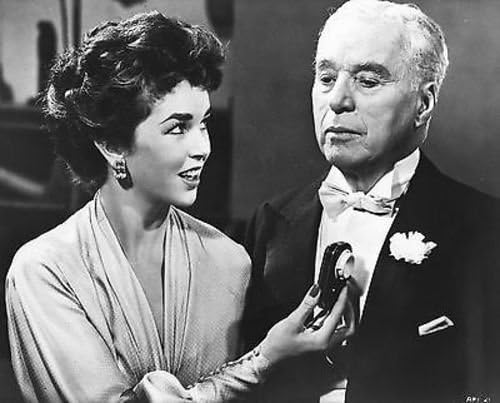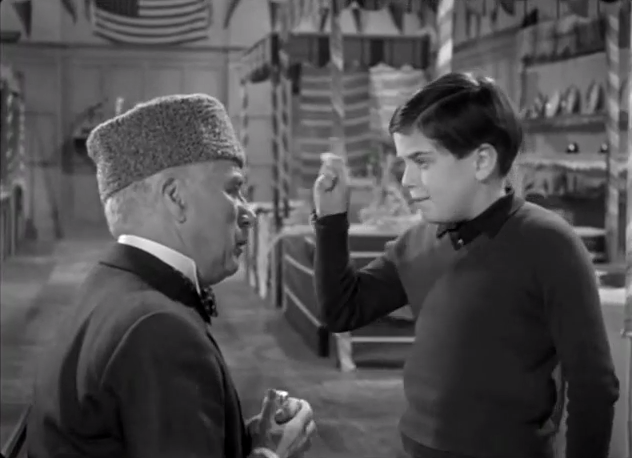movie review of A King in New York (1957) starring Charlie Chaplin, Dawn Addams
![]() There are some people who consider A King in New York to be a bitter screed against the United States of America by Charlie Chaplin, after his exile from it. I totally disagree. I would say that it’s a satire, poking fun at parts of America that need to be deflated …. But with a true love for the country. Take, for example, this quote by Charlie Chaplin’s character, King Shahdov, from early in the film:
There are some people who consider A King in New York to be a bitter screed against the United States of America by Charlie Chaplin, after his exile from it. I totally disagree. I would say that it’s a satire, poking fun at parts of America that need to be deflated …. But with a true love for the country. Take, for example, this quote by Charlie Chaplin’s character, King Shahdov, from early in the film:
“If you knew what it means to breathe this free air, this wonderful, wonderful America, its’ youth, its’ genius, its’ vitality. The glamor of it all — New York! America!’
The basic story
The basic plot of A King in New York deals with a European monarch, King Shahdov (played by Charlie Chaplin) who has been overthrown. He manages to escape to the United States of America, with plans for a nuclear power plant that he hopes will revolutionize modern living, creating an ‘utopia”. On his first night in America, he and his ambassador (played wonderfully by Oliver Johnston, who makes a great foil for Chaplin throughout the film) go to a movie theater. There, they and the audience sit through the “coming attractions”. giving Chaplin an opportunity to lampoon some of the silly trends running through Hollywood at the time, and today as well. They leave and go to eat at a restaurant, where they are placed directly by the club’s band. Giving Charlie Chaplin opportunity to clown around as he does best, having to pantomime orders for caviar and turtle soup to the waiter, who can’t hear him over the din.
The woman next door
The following morning, things go badly as the Prime Minister has stolen all of King Shahdov’s funds and fled to South America. Adding insult to injury, Shahdov’s young wife, Queen Irene comes to visit. And it’s revealed to the audience that their marriage had been arranged, supposedly loveless. And the king agrees to a divorce, so that she can find someone closer to her age and interests. That evening, depressed, King Shahdov doesn’t want to go out. He is planning to take a bath, until he hears a sound from the adjoining room. This gives birth to a very funny scene, with Charlie Chaplin and Johnston taking turns looking through the keyhole. They silently “fight” over the privilege of looking at the attractive young woman. But not talking so as not to alarm her. It’s a very funny routine that ends when the young lady starts calling for help.
Skewering television
The young lady calls for help and lures Shadov into her bathroom. Then she lures him into attending a boring society party that he’s been studiously avoiding. It turns out that she’s Ann Kay, played by the lovely Dawn Addams, a TV advertising specialist. She plans to have a hidden camera in the dining room and broadcast the dinner with King Shahdov live — Think ‘reality television.’ It’s quite funny when she gives a ‘commercial’ for deodorant, causing Shahdov to check himself for body odor! Likewise, later she gives a commercial for toothpaste, causing Charlie Chaplin to test himself for bad breath. Later, she entices him to perform Hamlet’s soliloquy, which his ambassador watches back at their hotel suite, and reveals the situation to Charlie Chaplin’s character. Upset, Chaplin goes out to a nightclub to relax. Only to have numerous patrons stop by the table to get autographs.
Skewering modern education
From this comes a flood of requests for the king to appear on television programs, endorse products, and so on … Which the king refuses initially. Dawn Addams comes by to apologize, delivering a note from the hostess of the party, along with a check for 20,000 dollars American. He tears up the check, until he realizes how little money he still has left. Afterward, he goes on a tour of a “progressive” school, poking fun at the then-current ideas of “modern” education, where the inmates are running the asylum. There are several funny moments, culminating with a confrontation with a young boy of 10 years old. He’s an anarchist named Rupert, played by Charlie Chaplin’s own son Michael. Rupert is very opinionated, quickly lecturing and not allowing the king a word in edgewise, ending in a bit of a slapstick with the young students.
Back at their hotel, it becomes plain that Shahdov is now broke. And Ann Kay brings in another endorsement offer for 50,000 dollars American to endorse Crown Whiskey. This leads to a very funny scene where the distinguished king films the commercial endorsing the “smooth” whiskey, which is ruined when he tastes the foul-tasting concoction and reacts honestly. The “spit take” commercial is a huge success, however, leading to billboards, posters, and photo shoots – and more money. This leads to Ann Kay suggesting that Shahdov consider plastic surgery. This gives Charlie Chaplin an opportunity to puncture America’s fascination with plastic surgery. Including a funny bit where Charlie Chaplin goes to a nightclub where he starts laughing before his face has finished healing and he fears that his ‘new face’ is going to fall off.
Homeless Rupert
After getting his plastic surgery reversed, Shahdov runs into Rupert on the street during a snowstorm, who is apparently now homeless. He takes Rupert to his apartment, where his ambassador is afraid that the boy’s parents’ political beliefs (communists) may impact Shahdov’s pending attempt to meet with the Atomic Energy Commission. This leads into Rupert being in the apartment by himself while Shadov and the ambassador run to the bank to retrieve the plans for the atomic power plant. An innocent conversation soon turns into Rupert attempting to lecture the commissioners, leading to a confrontation where the commissioners are about to accuse him of being a Communist. Shortly afterward it become clear that Rupert’s parents are, indeed, Communist Party members. They refuse to name any other members of that party, and are being held for contempt of Congress. Shortly afterward, a U.S. Marshall comes to pick up Rupert, and return him to the school.
Once it becomes known that King Shahdov has been “hiding” Rupert, Shadov is accused of being in league with Communists, and conspiring to share nuclear secrets with Communist nations. A funny slapstick bit follows, with both Shahdov and his ambassador being too nervous to pour tea. And the film now begins in earnest to poke fun at the paranoia in the United States over the Communist threat seeing ‘a Red under every bed’ as the saying went. As the king tries to escape from the hotel unmolested, he’s again mobbed by autograph seekers… Only to be served with papers to appear before Congress. Meanwhile, Rupert is being pressured to give the names of his parents’ friends.
Rushing to the hearing
As King Shahdov rushes to be on time to the congressional hearing, Charlie Chaplin plays the scene for all the slapstick that it’s worth, getting his finger stuck in a fire hose in the elevator, eventually taking the hose with him to the hearing, where someone connects the other end, resulting in Charlie hosing down the House Unamerican Activities Commission. Despite this, he gives his honest testimony, and are is cleared of all charges. Rupert, in the meantime, has named his parents’ friends, in order to release them from custody. The film ends with King Shahdov, recognizing the “temporary insanity” going on in the United States, decides to wait it out in Europe.
Funny movie quotes from Charlie Chaplin’s A King in New York
King Shahdov (Charlie Chaplin): I’d sooner be thought a successful crook than a destitute monarch.
King Shahdov (Charlie Chaplin): [at a dinner party, after having seen Ann Kay in the bathtub] I’d like to see more of you.
Rupert: Does free speech exist?
King Shahdov (Charlie Chaplin): No, you’ve got it all!
[Rupert is haranguing the King]
Rupert Macabee: Monopoly is the menace of free enterprise. As I look back, sixty years ago — ¦
King Shahdov (Charlie Chaplin): Where were you sixty years ago?
another schoolboy: He was a glint in his great-grandfather’s eye!
[after being called for questioning by the government on suspicions of Communist affiliations]
Rupert Macabee: I’m so sick and tired of people asking me if I’m this, if I’m that!
[after being told that the political turmoil in America is just a passing phase.]
King Shahdov (Charlie Chaplin): Quite so. In the meantime, I’ll sit it out in Europe.
Lawyer: Your Majesty, first and foremost, you must stand on your rights and demand immunity on the ground of your Royal Prerogative.
King Shahdov (Charlie Chaplin): Immunity from what?
Lawyer: That I don’t know, but I intend to find out. But if they put the 64 dollars question to you, as if you are, or ever have been a communist, then again you must stand on your Royal Prerogative.
King Shahdov (Charlie Chaplin): But that question is absurd.
Lawyer: There are many things absurd these days…
Trivia about Charlie Chaplin’s A King in New York
- The first film that Charles Chaplin made in the UK after his exile from America, and his last leading role in a movie.
- Filmed at Shepperton Studios.
- Shot for only 12 weeks, the shortest of all Chaplin films.
- Before conceiving the idea for this film, Charles Chaplin had thought of two ideas that he decided against, one was the idea of reviving the tramp (because he realized that the appeal to the tramp was his flexibility), and reviving Verdoux from Monsieur Verdoux (1947) (his wife and assistant strongly decided against it.)
- Dawn Addams replaced Kay Kendall.
Editorial review of A King in New York, starring Charlie Chaplin, courtesy of Amazon.com
A King in New York, Charlie Chaplin’s penultimate film–featuring his final starring performance–was made in 1957 but wasn’t officially released in America until the — 70s, when it, surprisingly enough, won an Oscar for Chaplin’s score. What took so long? Thanks to his politics and unorthodox personal life, Chaplin was pretty roundly hated by the late — 50s, but had the movie been better, someone might’ve brought it stateside sooner. Chaplin plays King Shahdov of Estrovia, on the lam when revolution grips his homeland. In New York, despite the occasional indignity, he’s treated as royalty until he takes a stand against the commie-hunters, a plotline that hit way too close to home at the time (Chaplin, remember, was ahead of everyone in attacking Hitler when he made The Great Dictator). There’s one inspired bit, as Shahdov orders dinner over the din of a supper club, but overall, the satire is strident, and Chaplin’s takes on such things as technology and pop music make him look decidedly like an old fogy. —David Kronke




